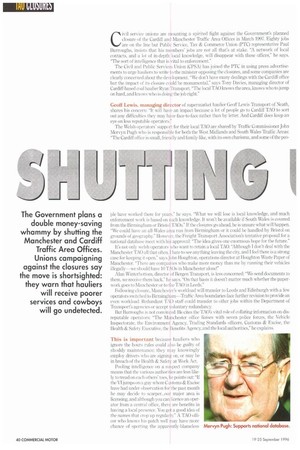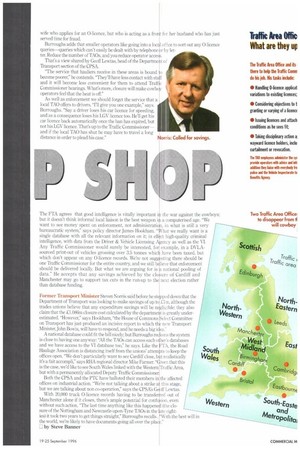C iv il service unions are mounting a spirited fight against
Page 42

Page 43

If you've noticed an error in this article please click here to report it so we can fix it.
the Government's planned closure of the Cardiff and Manchester Traffic Area Offices in March 1997. Eighty jobs are on the line but Public Service, Tax & Commerce Union (FTC) representative Paul Burroughs, insists that his members' jobs are not all that's at stake. "A network of local contacts, and a lot of in-depth local knowledge, will disappear with these offices," he says. "The sort of intelligence that is vital to enforcement." The Civil and Public Services Union (C1'SA) has joined the p-rc in using press advertisements to urge hauliers to write to the minister opposing the closures, and some companies are clearly concerned about the development. "We don't have many dealings with the Cardiff office hut the impact of its closure could be monumental." says Tony Davies, managing director of Cardiff-based coal haulier Ryan Transport. "The local TAO knows the area, knows who to jump on hard, and knows who is doing the job right."
Geoff Lewis, managing director of supermarket haulier Geoff Lewis Transport of Neath, shares his concern: "It will have an impact because a lot of people go to Cardiff TAO to sort out any difficulties they may have face-to-face rather than by letter. And Cardiff does keep an eye on less reputable operators."
The Welsh operators' support for their local TAO are shared by Traffic Commissioner John Mervyn Pugh who is responsible for both the West Midlands and South Wales Traffic Areas: "The Cardiff office is small, friendly and family-like, with its own charisma, and some of the peo
pie have worked there for years." he says. "What we will lose is local knowledge, and much enforcement work is based on such knowledge. it won't be available if South Wales is covered from the Birmingham or Bristol TA0s." If the closures go ahead, he is unsure what will happen. "We could have an all-Wales an:a run from Birmingham or it could be handled by Bristol on grounds of geography." Ilowever, the Freight Transport Association's tentative proposal for a national database meet with his approval: "The idea gives one enormous hope for the future."
It's not only welsh operators who want to retain a local TAO. 'Although I don't deal with the Manchester TAO all that often, I hate to see anything leaving the city, and 1 feel there iS a strong case for keeping it open," says john Houghton, operations director at Houghton Waste Paper of Manchester, "There are companies who make more money than me by running their vehicles illegally—we should have ID TAOs in Manchester alone!"
Alan Winterbottom, director id Bergen Transport, is less concerned: "We send documents to them, we receive them back," he says. "On that basis it doesn't matter much whether the paperwork goes to Manchester or ii the TAO in Leeds."
R.illowing closure, Ma ncla‘ster's workload will transfer to Leeds and Edinburgh with a few Operators switched to Birmingham—Traffic Area Is mndaries face further revision to provide an even workload, Redundant TAO staff could transfer to other jobs within the Department of Transport's agencies c)r accept voluntary redundancy.
But Burroughs is not convinced. lie cites the TAO's vital role of collating information on dis, reputable operators: "The Manchester office liaises with seven police forces, the Vehicle inspectorate, the Environment Agency, Trading Standards officers, Customs Sz Excise, the Health & Safety Executive, the ienefits Agency, and the local authorities," he explains.
This is important because hauliers who ignore the hours rules could also be guilty of shoddy maintenance; they may knowingly employ drivers 'ho are signing on, or may be in breach of the Health ts'z Safety at Work Act.
Pooling intelligence on a suspect company means that the various authorities are less likely to tread on each others' toes, he points out: "If the VI jumps I in a guy whom Customs & Excise have had under observation for the past month he may decide to scarper...rair major area is licensing, and alt hi argh you can licence an operator from a central office, there are benefits in having a local presence. You gel a good idea of the names that en ip up regularly." A TAO officer who knows his patch well may have more chance of spotting the apparently-blameless
wife who applies for an 0-licence, but who is acting as a fro for her husband who has just served time for fraud.
Burroughs adds that smaller operators like going into a I **I office to sort out any 0-licence queries—queries which can't easily be dealt with by telephone ir by letter. Reduce the number of TAOs. and you reduce operator acce.
That's a view shared by Geoff Lewtas, head of the Departme Transport section of the CPSA.
"The service that hauliers receive in these areas is bound become poorer," he contends. "They'll have less contact with st and it will become less convenient for them to attend Tra Commissioner hearings. What's more, closure will make cowb( operators feel that the heat is off."
As well as enforcement we should forget the service that a local TAO offers to drivers. "I'll give you one example," says. Burroughs. "Say a driver loses his car licence for speeding, and as a consequence loses his LGV licence too. He'll get his car licence back automatically once the ban has expired, but not his LGV licence. That's up to the Traffic Commissioner— and if the local TAO has shut he may have to travel a long
distance in order to plead his case." Norris: Called for savings.
The FTA agrees that good intelligence is vitally important ih the war against the cowboys; but it doesn't think informal local liaison is the best weapon it a computerised age. "We want to see money spent on enforcement, not administratiok in what is still a very bureaucratic system," says policy director James Hookham. "What we really want is a single database with all the relevant information on it; in effect high-quality criminal intelligence, with data from the Driver & Vehicle Licensing Agency as well as the VI. Any Traffic Commissioner would surely be interested, foil example, in a DVLAsourced print-out of vehicles grassing over 3.5 tonnes which have been taxed, but which don't appear on any 0-licence records. 'We're not suggesting there should be one Traffic Commissioner for the entire country, and we still blieve that enforcement should be delivered locally. But what we are arguing for is i national pooling of data." He accepts that any savings achieved by the clo ure of Cardiff and Manchester may go to support tax cuts in the run-up to the next election rather than database funding, Former Transport Minister Steven Norris said before he st ped down that the Department of Transport was looking to make savings of up t £1 in. although the trades unions believe that any expenditure savings will be n ligible: they also claim that the £1.086m closure cost calculated by the departmelit is greatly underestimated. "However." says Hookham, "the House of Commons Select Committee on Transport has just produced an incisive report to which the new Transport Minister, John Bowis, will have to respond, and he needs a big kjea.
A national database could fit the bill nicely; but Burroughs reckons the system is close to having one anyway: "All the TAOs can access each other's databases , and we have access to the VI database too," he says. Like the 'TA, the Road 1 Haulage Association is distancing itself from the unions' attem ts to keep the j offices open. "We don't particularly want to see Cardiff close, bit realistically it's a fait accompli," says RHA regional director Mike Farmer. " wen that this is the case, we'd like to see South Wales linked with the Western, fraffic Area, but with a permanently allocated Deputy Traffic Commissioned
offices on industrial action. "We're not talking about a strike a this stage, Both the CPSA and the PTC have balloted their members in the affected ti ,
but we are talking about non co-operation," says the CPSA's G iff Lewtas. I With 20,000 truck 0-licence records having to be transfetfed out of , Manchester alone if it closes, there's ample potential for con4ion. even
without such action. "The last time anything like this happen (the clo sure of the Nottingham and Newcastle-upon-Tyne TAOs in the xte eight
ies) it took two years to get things straight," Burroughs recalls. rWith the best will in
the world, we're likely to have documents going all over the pla _ by Steve Banner








































































































